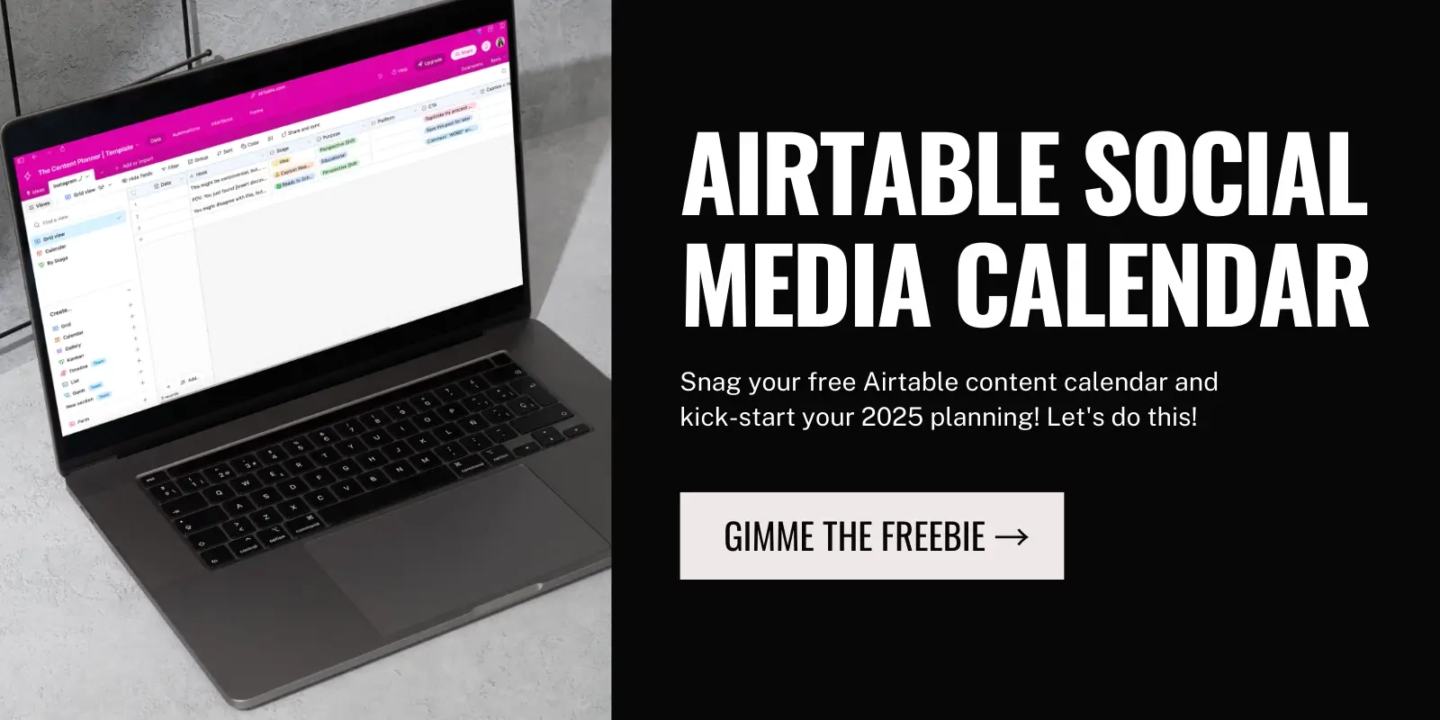As a blogger, it’s easy to get caught up in the daily grind of creating content, engaging with your audience, and navigating the ever-changing landscape of the blogosphere. However, without a clear set of blog goals to guide your efforts, you risk spinning your wheels and missing out on opportunities for growth and success.
Goal-setting is a powerful tool that can help you stay focused, motivated, and on track to achieve your desired outcomes. By defining what success looks like for your blog, you can create a roadmap that aligns your actions with your aspirations, allowing you to make the most of your time and resources.
Setting goals for your blog isn’t just about increasing blog traffic or monetisation; it’s about crafting a vision for the impact you want to make, the audience you want to reach, and the legacy you want to leave behind. Whether you’re aiming to establish yourself as a thought leader in your niche, build a loyal community of engaged readers, or create a sustainable income stream, clearly defined goals can serve as your compass, keeping you oriented towards your true north.

Table of Contents
- The Blogging Struggle: Finding Direction in a Crowded Space
- Defining Success for Your Blog in 2025
- Audit Your Blog’s Current State
- Embracing the SMART Goal-Setting Framework for Blogging Success
- The Power of Productivity Tools for Goal-Setting
- Crafting a Content Strategy Aligned with Your Blog’s Goals
- Measure, Evaluate, and Adjust: The Key to Staying on Track
- Celebrating Milestones and Maintaining Motivation
- Conclusion: Embrace Goal-Setting for Blogging Success
The Blogging Struggle: Finding Direction in a Crowded Space
As a blogger, you’ve poured your heart and soul into creating content that resonates with your audience. You’ve spent countless hours researching, writing, and promoting your work, all in the hopes of building a successful online presence. However, as the blogosphere continues to grow more crowded, it can be easy to feel lost in the sea of voices vying for attention.
You’ve likely experienced moments where you’ve questioned your direction, wondering if your efforts are truly making an impact. Perhaps you’ve found yourself caught up in the never-ending cycle of creating content without a clear strategy or measurable blog goals. It’s in these moments that the importance of goal-setting becomes paramount, as it provides a guiding light to steer your blogging journey toward purposeful growth and success.
Defining Success for Your Blog in 2025
It’s crucial to have a clear vision of what success looks like for your platform. In 2025, the blogging space will likely be even more competitive and dynamic, with new technologies and trends shaping the way content is created and consumed. Success may take on different forms, depending on your blog goals and priorities.
For some bloggers, success might mean amassing a large and engaged readership, with their content resonating with a global audience. Others might define success as generating a substantial income stream from their blog, either through advertising, sponsored content, or product sales. Some might view success as establishing themselves as an influential thought leader in their niche, shaping conversations and driving industry trends.
Regardless of your specific definition, it’s essential to have a clear understanding of what success looks like for you in 2025. This will help you set realistic and measurable blogging goals, and develop a strategic plan to achieve them. Consider factors such as your target audience, the topics you cover, the platforms you use, and the monetisation strategies you employ. By envisioning what success looks like, you can chart a course that aligns with your aspirations and positions your blog for long-term growth and impact.
Audit Your Blog’s Current State
To set effective goals for your blog’s future, you must first understand its present condition. Take an honest and critical look at your blog’s performance, traffic, engagement, and overall impact. Identify areas where you excel and those that need improvement. Conduct a thorough analysis of your analytics data, reader feedback, and industry trends. This audit will provide valuable insights and a solid foundation for crafting realistic and achievable blog goals tailored to your blog’s unique needs and potential.
Emphasise your blog’s strengths and leverage them as building blocks for growth. Perhaps you have a loyal following for your thought-provoking content or a particular niche expertise. Capitalise on these assets and explore ways to amplify their impact. Conversely, pinpoint weaknesses or areas of underperformance, such as low audience engagement or inconsistent posting schedules. Acknowledging these shortcomings will help you develop targeted strategies to address them.
Furthermore, identify opportunities for expansion or innovation. Are there untapped content formats, platforms, or collaborations that could elevate your blog’s reach and influence? By thoroughly auditing your blog’s current state, you’ll gain a comprehensive understanding of its trajectory, enabling you to set well-informed blog goals that align with your vision for success in 2025.
Embracing the SMART Goal-Setting Framework for Blogging Success
The SMART goal-setting framework is a powerful tool that can help bloggers define and achieve their objectives with clarity and focus. By setting blog goals that are Specific, Measurable, Achievable, Relevant, and Time-bound, bloggers can streamline their efforts and increase their chances of success.
Specific goals provide a clear target to aim for, eliminating ambiguity and ensuring that everyone involved understands what needs to be accomplished. For example, instead of setting a vague goal like “increase traffic,” a specific goal could be “increase monthly website visitors from 5,000 to 10,000 by the end of the year.”
Measurable goals allow bloggers to track their progress and make data-driven decisions. By setting quantifiable targets, such as “increase email subscribers by 25% in the next six months,” bloggers can easily determine whether they are on track or need to adjust their strategies.
Achievable blog goals are realistic and attainable, taking into account the resources, skills, and constraints of the blogger. Setting unrealistic goals can lead to frustration and demotivation, so it’s essential to strike a balance between ambition and feasibility.
Relevant blog goals align with the blogger’s overall vision, values, and priorities. They should contribute to the long-term growth and success of the blog, rather than being disconnected or irrelevant pursuits.
Time-bound goals have specific deadlines or target dates, creating a sense of urgency and accountability. By setting a clear timeline, such as “publish two in-depth blog posts per week for the next three months,” bloggers can better manage their time and stay focused on their objectives.
By incorporating the SMART goal-setting framework into their blogging strategy, bloggers can increase their chances of success, stay motivated, and make measurable progress toward their desired outcomes.

The Power of Productivity Tools for Goal-Setting
As a blogger, staying organised and focused is crucial for achieving your long-term blog goals. Fortunately, there are powerful productivity tools available that can streamline your goal-planning process and help you stay on track. Two standout options are Airtable and Notion, which offer versatile features to help you define, track, and accomplish your objectives.
Airtable is a spreadsheet-database hybrid that allows you to organise your tasks, ideas, and projects in a visually appealing and intuitive way. With its flexible views and customisable fields, you can create detailed content calendars, track your progress, and collaborate seamlessly with your team. Airtable’s intuitive interface and automation can save you countless hours, freeing up more time for content creation.
Notion, on the other hand, is an all-in-one workspace that combines note-taking, task management and wikis into a single platform. Its powerful database capabilities and customisable templates make it an excellent tool for bloggers to organise their ideas, research, and workflows. With Notion, you can create detailed editorial calendars, track your progress towards goals, and even collaborate with team members or guest contributors.
Both Airtable and Notion offer mobile apps, ensuring that you can access and update your blog goals and plans on the go. By leveraging these productivity tools, you can streamline your goal-setting process, stay organised, and increase your chances of achieving your blogging aspirations in 2025 and beyond.
Crafting a Content Strategy Aligned with Your Blog’s Goals
Defining clear goals for your blog is only the first step towards success. To truly thrive in the digital marketing space, it’s important to develop a comprehensive content strategy that aligns with those goals. A well-crafted content strategy serves as a roadmap, guiding your efforts in content creation, promotion, and distribution.
By aligning your content strategy with your blog’s objectives, you ensure that every piece of content you produce contributes to the overarching vision. Whether your goal is to establish thought leadership, drive traffic and engagement, or monetise your platform, your content strategy should support and amplify those aspirations.
Crafting a content strategy involves several key elements:
- Understanding Your Audience: Conduct thorough research to gain insights into your target audience’s interests, pain points, and content preferences. This understanding will inform the topics you cover, the tone you adopt, and the formats you utilise.
- Defining Content Pillars: Identify the core themes or subject areas that your blog will focus on. These content pillars should be directly tied to your goals and resonate with your target audience.
- Establishing a Content Calendar: Plan and organise your content creation efforts by developing a content calendar. This calendar should outline the topics, formats, and publishing schedules, ensuring a consistent flow of high-quality content.
- Promoting and Distributing Content: Your content strategy should encompass tactics for promoting and distributing your content across various channels, such as social media, email marketing, and collaborations with influencers or industry partners.
- Measuring and Optimising: Implement metrics and analytics to track the performance of your content and adjust your strategy accordingly. Continuously analyse what resonates with your audience and refine your approach to maximise impact and achieve your goals.
By investing time and effort into crafting a comprehensive content strategy, you’ll be better equipped to create content that captivates your audience, establishes your authority, and propels your blog towards long-term success.
Measure, Evaluate, and Adjust: The Key to Staying on Track
Defining goals is just the first step in the journey towards success. As you embark on your blogging adventure, it’s crucial to regularly measure your progress, evaluate the results, and make necessary adjustments to your goals and strategies. This iterative process ensures that you remain on the right path, adapting to changing circumstances and capitalising on emerging opportunities.
Measuring progress involves tracking key metrics that align with your goals. For instance, if your aim is to increase readership, you might monitor website traffic, social media engagement, and subscriber growth. If your objective is to monetise your blog, you would track revenue streams, conversion rates, and other relevant financial indicators.
Once you have collected data, it’s time to evaluate the results objectively. Analyze the trends, identify areas of strength and weakness, and determine what’s working and what’s not. This evaluation phase is crucial for making informed decisions about your blog’s future direction.
Based on your analysis, you may need to adjust your goals or strategies. Perhaps your initial targets were too ambitious or too conservative. Maybe you need to explore new content formats, promotional channels, or monetisation methods. Embracing flexibility and adaptability is essential in the ever-evolving world of blogging.
Remember, goal setting is not a one-time event but an ongoing process. As your blog evolves and your audience grows, your goals will likely shift and expand. Regularly measuring, evaluating, and adjusting your approach will keep you focused, motivated, and aligned with your long-term vision for success.
Celebrating Milestones and Maintaining Motivation
Setting goals is a journey, and it’s essential to celebrate the milestones along the way. Every accomplishment, no matter how small, deserves recognition and appreciation. Celebrating your achievements can provide a much-needed boost of motivation and remind you of the progress you’ve made.
Maintaining a positive mindset throughout the goal-setting process is crucial. It’s easy to get discouraged when faced with setbacks or challenges, but a positive attitude can help you overcome obstacles and stay focused on your objectives. Surround yourself with supportive individuals who believe in your vision and can offer encouragement when you need it most.
Remember that goal-setting is a continuous process, and it’s okay to adjust your plans as circumstances change. Celebrate your wins, learn from your setbacks, and keep moving forward with determination and a positive outlook.
Conclusion: Embrace Goal-Setting for Blogging Success
Setting clear, actionable goals is crucial for bloggers who want to achieve long-term success and fulfilment. By defining what success means to you and creating a roadmap to get there, you’ll be better equipped to navigate the ever-changing landscape of content creation and stay focused on your priorities.
Remember, goal-setting is not a one-time exercise; it’s an ongoing process that requires regular review, adjustment, and recommitment. As your blog evolves and your personal or professional aspirations shift, be willing to reevaluate your goals and realign them with your current vision.
Ultimately, goal-setting empowers you to take control of your blogging journey, measure your progress, and celebrate your achievements along the way. Embrace this powerful practice, and watch as your blog transforms from a passion project into a thriving platform that inspires, informs, and leaves a lasting impact on your audience.





















0 Comments